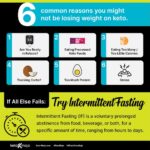Losing weight with a hiatal hernia is possible through dietary adjustments and exercise. Hiatal hernia is a condition in which the upper part of the stomach protrudes through the diaphragm, causing symptoms such as heartburn and acid reflux.
Despite this condition, weight loss can still be achieved by following a healthy eating plan and engaging in physical activity. Adjusting the diet to include smaller, more frequent meals, avoiding trigger foods, and maintaining a balanced intake of nutrients can help manage symptoms and assist with weight loss.
Incorporating exercise, such as cardiovascular activities and strength training, can also contribute to shedding excess weight. It is important to consult a healthcare professional for personalized advice tailored to individual circumstances.
What Is A Hiatal Hernia?
Hiatal hernia is a medical condition that affects a significant number of people, causing discomfort and sometimes leading to more severe complications. Understanding what a hiatal hernia is and its causes is crucial in managing and treating the condition effectively. In this section, we will explore the definition and causes of a hiatal hernia, shedding light on the symptoms and complications that individuals with this condition may experience.
Definition And Causes
A hiatal hernia occurs when a portion of the stomach pushes upward through the diaphragm muscle, into the chest cavity. This displacement happens at the hiatus, a small opening in the diaphragm through which the esophagus passes.
The causes of hiatal hernias are diverse and can be attributed to several factors:
- Age: Hiatal hernias are more commonly observed in individuals over the age of 50.
- Obesity: Excessive weight can put pressure on the abdominal area, leading to a hiatal hernia.
- Pregnancy: The growing uterus can cause displacement of the stomach and contribute to a hiatal hernia.
- Weak muscles: Weakness in the diaphragm muscles can allow the stomach to protrude into the chest cavity.
- Chronic pressure: Frequent and prolonged strain on the abdominal muscles, such as consistent heavy lifting or intense coughing, can increase the risk of developing a hiatal hernia.
These factors can weaken the muscles and tissues around the hiatus, making it easier for the stomach to move upward into the chest cavity.
Symptoms And Complications
Hiatal hernias can present a variety of symptoms and lead to potential complications. Some common symptoms of a hiatal hernia include:
- Heartburn: The backward flow of stomach acid into the esophagus can cause a burning sensation in the chest.
- Difficulty swallowing: Displacement of the stomach can affect the normal functioning of the esophagus, making it challenging to swallow food or liquids.
- Chest pain: Individuals with hiatal hernias may experience intermittent chest pain, which can be mistaken for a heart attack.
- Regurgitation: The backflow of stomach contents, including acid and undigested food, into the mouth.
While many people with hiatal hernias may not experience severe complications, some may face more significant challenges. Complications can include:
- Strangulation: In rare cases, the herniated portion of the stomach may become trapped in the widened hiatus, potentially cutting off the blood supply and requiring immediate medical attention.
- Ulcers and bleeding: Long-term irritation and acid reflux can lead to the development of ulcers in the esophagus or stomach, which may result in bleeding.
- Esophagitis: Inflammation of the esophagus can occur due to constant exposure to stomach acid, causing discomfort and difficulty swallowing.
By understanding and recognizing the symptoms and complications associated with hiatal hernias, individuals can seek timely medical attention and appropriate treatment options.
Why Is Weight Loss Important For Hiatal Hernia?
Weight loss plays a crucial role in managing hiatal hernia. Excess weight puts additional pressure on the abdomen, leading to increased strain on the diaphragm and weakening of the muscles that keep the stomach in place. This can worsen hiatal hernia symptoms and increase the risk of complications. Losing weight helps relieve the pressure and reduce the severity of symptoms associated with hiatal hernia.
Impact Of Excess Weight
Carrying excess weight can have a negative impact on your hiatal hernia. When you are overweight, the extra pounds push down on the abdomen, causing the stomach to be forced upward through the diaphragm and into the chest cavity. This can result in the opening of the hiatus, the opening in the diaphragm through which the esophagus passes, becoming wider. As a result, acid from the stomach can flow back into the esophagus, leading to the development of acid reflux and heartburn.
Furthermore, excess weight can also weaken the muscles surrounding the stomach and the esophagus. This makes it difficult for these muscles to properly keep the stomach in place, causing it to slide up into the chest more easily. This movement can further aggravate the symptoms of hiatal hernia, including chest pain, difficulty swallowing, regurgitation, and shortness of breath.
Benefits Of Weight Loss
Losing weight can bring about numerous benefits for individuals with hiatal hernia:
- Reduced pressure on the abdomen: Weight loss helps alleviate the strain on the diaphragm, preventing the stomach from protruding into the chest cavity. This helps to decrease the symptoms associated with hiatal hernia.
- Improved muscle tone: Shedding excess weight aids in toning the muscles around the stomach and esophagus. Stronger muscles provide better support and help prevent the stomach from sliding up into the chest, reducing the risk of complications.
- Relief from acid reflux: Losing weight can reduce the frequency and severity of acid reflux. As the stomach stays in its proper position, the flow of stomach acid back into the esophagus decreases, alleviating the symptoms of heartburn, chest pain, and regurgitation.
- Enhanced overall health: Weight loss not only benefits the symptoms of hiatal hernia but also contributes to overall well-being. Shedding excess pounds can lower blood pressure, reduce the risk of heart disease, and improve glucose control, reducing the chances of developing related conditions.
By adopting healthy eating habits and incorporating exercise into your routine, you can achieve weight loss, which will invariably have a positive impact on your hiatal hernia. While weight loss is important, it is advisable to consult with your healthcare provider or a registered dietitian before starting any weight loss program, especially if you have a hiatal hernia.
Creating A Healthy Diet Plan
When it comes to managing weight with a hiatal hernia, developing a healthy diet plan is crucial. By focusing on nutritious choices and portion control, you can support your weight loss goals while managing your hernia symptoms. Here are some key elements to consider when creating your diet plan.
Foods To Include
Include a variety of nutrient-rich foods in your diet to support weight loss and overall well-being. Some top choices include:
- Fruits and vegetables: Load up on colorful fruits and vegetables to benefit from essential vitamins, minerals, and fiber.
- Lean proteins: Opt for lean sources of protein such as poultry, fish, tofu, and legumes to keep you feeling satisfied.
- Whole grains: Choose whole grains like brown rice, quinoa, and whole wheat bread to provide lasting energy and added fiber.
- Low-fat dairy: Incorporate low-fat dairy products like yogurt, milk, and cheese for their calcium and protein content.
- Healthy fats: Include sources of healthy fats, such as avocados, nuts, and olive oil, in moderation to promote satiety.
- Hydrating beverages: Stay hydrated with water and herbal teas while limiting sugary drinks and alcoholic beverages.
Foods To Avoid
Avoiding certain foods can help alleviate hiatal hernia symptoms and contribute to weight loss. Be mindful of the following:
- Acidic foods: Cut back on acidic foods and beverages like citrus fruits, tomatoes, coffee, and carbonated drinks, as they may trigger acid reflux.
- Fried and fatty foods: Limit your intake of fried and fatty foods, as they can worsen heartburn and contribute to weight gain.
- Spicy foods: Reduce or eliminate spicy foods, such as chili pepper, hot sauce, and curry, as they can irritate the esophagus.
- Processed snacks: Minimize processed snacks like chips, cookies, and candies, which are often high in unhealthy fats and sugars.
- Highly processed grains: Choose whole grains over highly processed grains like white bread and white pasta, which offer less nutritional value.
- High-calorie beverages: Steer clear of sugary sodas, sweetened juices, and energy drinks, as they can hinder weight loss efforts.
Meal Timing And Portion Control
In addition to choosing the right foods, paying attention to meal timing and portion control is essential. Consider the following strategies:
- Eat smaller, more frequent meals: Consuming several small meals throughout the day instead of three large ones can help prevent excessive stomach stretching.
- Avoid eating close to bedtime: Allow at least two to three hours between your last meal or snack and bedtime to reduce the chances of acid reflux.
- Practice mindful eating: Slow down and listen to your body’s hunger and fullness cues to prevent overeating and promote better digestion.
- Watch your portions: Use smaller plates and bowls to control portion sizes, and aim for a balanced plate with a mix of proteins, whole grains, and vegetables.
- Avoid late-night snacking: Limit late-night snacks, as they can disrupt digestion and contribute to weight gain.
Effective Exercise For Weight Loss And Hiatal Hernia
When it comes to weight loss with a hiatal hernia, choosing the right exercises is crucial. While some exercises can put strain on the abdomen and worsen the symptoms, others can be highly effective without causing any harm. In this article, we will explore different types of exercises that can help you shed those extra pounds while managing your hiatal hernia.
Low-impact Cardiovascular Exercises
If you have a hiatal hernia, it’s important to focus on low-impact cardiovascular exercises that don’t put excessive pressure on your abdomen. These exercises are gentle on your body, yet effective in burning calories and promoting weight loss. Some of the best low-impact cardiovascular exercises include:
- Walking: A simple and accessible exercise that can be done anywhere, walking is a great way to get your heart rate up and burn calories.
- Swimming: This non-weight bearing exercise is gentle on your joints and provides a full-body workout, making it an ideal choice for those with a hiatal hernia.
- Cycling: Whether you prefer outdoor cycling or using a stationary bike, cycling is a low-impact exercise that can help you burn calories and improve cardiovascular health.
- Elliptical training: Using an elliptical machine can provide a low-impact workout that targets multiple muscle groups, without putting strain on your abdomen.
Strength Training Exercises
Strength training exercises are essential for weight loss as they help build lean muscle mass, increase metabolism, and improve overall body composition. However, it’s important to choose exercises that don’t exacerbate your hiatal hernia symptoms. Here are some safe and effective strength training exercises for individuals with a hiatal hernia:
- Bodyweight exercises: Push-ups, squats, lunges, and planks are great examples of bodyweight exercises that can be performed without putting excess strain on your abdomen.
- Lightweight lifting: Using light dumbbells or resistance bands, you can perform exercises such as bicep curls, shoulder presses, and tricep extensions to strengthen your muscles without causing discomfort.
- Pilates: This low-impact exercise method focuses on core strength, flexibility, and body alignment, making it suitable for individuals with a hiatal hernia.
Stretching And Flexibility Exercises
Stretching and flexibility exercises are often overlooked but are crucial for maintaining a healthy range of motion and preventing injuries. When it comes to hiatal hernia and weight loss, incorporating stretching and flexibility exercises can help relieve tension in the muscles and improve overall mobility. Here are some exercises to consider:
- Yoga: Known for its gentle stretching and relaxation techniques, yoga can help improve flexibility, reduce stress, and promote weight loss.
- Pilates: In addition to its strength training benefits, Pilates also includes stretching exercises that can help elongate and strengthen your muscles.
- Static stretches: Holding gentle stretches for various muscle groups, such as hamstrings, calves, and chest, can help relieve muscle tension and improve flexibility.
Other Lifestyle Changes To Support Weight Loss
Losing weight with a hiatal hernia can be a challenging process, but there are several other lifestyle changes you can make to support your weight loss journey. By making these adjustments, you can not only improve your overall health but also reduce the symptoms associated with a hiatal hernia. Here are three important lifestyle changes you should consider:
Managing Stress
Stress can worsen the symptoms of a hiatal hernia and make it more difficult to lose weight. By implementing stress management techniques into your daily routine, you can reduce stress levels and support your weight loss efforts. Here are a few effective strategies:
- Practicing deep breathing exercises
- Taking up yoga or meditation
- Scheduling regular breaks and leisure activities
- Engaging in hobbies that you love
- Talking to a therapist or joining a support group
Improving Sleep Quality
Getting quality sleep is essential for weight loss and overall well-being. When you don’t get enough sleep or experience poor sleep quality, it can lead to hormonal imbalances that can hinder your weight loss progress. To improve your sleep quality, try the following:
- Establishing a regular sleep routine
- Avoiding stimulating activities before bedtime
- Creating a comfortable sleep environment
- Limiting caffeine and alcohol intake
- Engaging in relaxation techniques before bed
Quitting Smoking And Reducing Alcohol Consumption
Smoking and excessive alcohol consumption can negatively impact your weight loss efforts and aggravate hiatal hernia symptoms. Quitting smoking and reducing your alcohol intake can help you achieve your weight loss goals more effectively. Here’s how you can start:
- Seeking professional help or support groups to quit smoking
- Taking gradual steps to reduce alcohol consumption
- Focusing on other healthy habits to replace these vices
- Surrounding yourself with supportive friends and family
- Keeping track of your progress to stay motivated
Frequently Asked Questions Of Weight Loss With Hiatal Hernia
Can You Lose Weight With A Hiatal Hernia?
Yes, it is possible to lose weight with a hiatal hernia through a combination of diet and exercise.
Conclusion
Weight loss with a hiatal hernia can be challenging but not impossible. By adopting a balanced diet, regular exercise, and mindful eating habits, individuals can effectively manage their symptoms and achieve their weight loss goals. It is important to consult with a healthcare professional for personalized guidance and support throughout the journey.
Remember, gradual progress and consistency are key to success. Embrace a healthy lifestyle and take control of your well-being.
{ “@context”: “https://schema.org”, “@type”: “FAQPage”, “mainEntity”: [ { “@type”: “Question”, “name”: “Can you lose weight with a hiatal hernia?”, “acceptedAnswer”: { “@type”: “Answer”, “text”: “Yes, it is possible to lose weight with a hiatal hernia through a combination of diet and exercise.” } } ] }









Leave a Reply